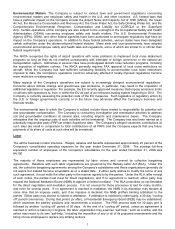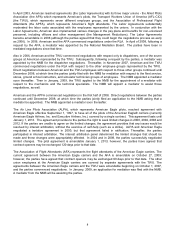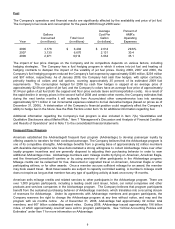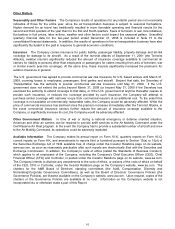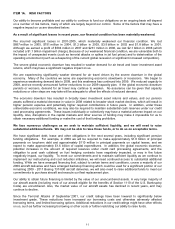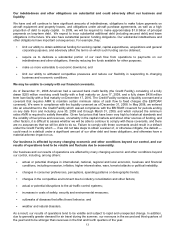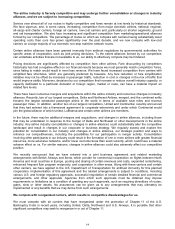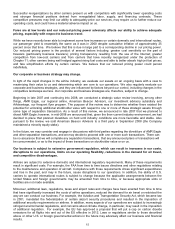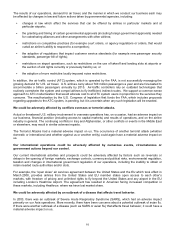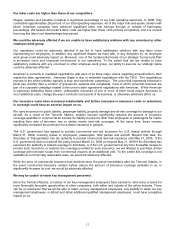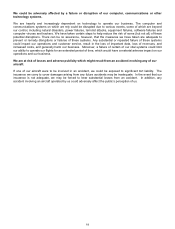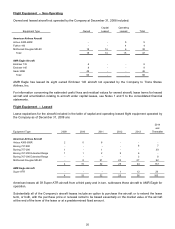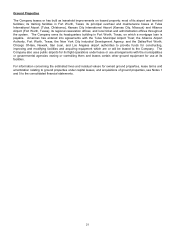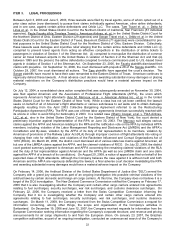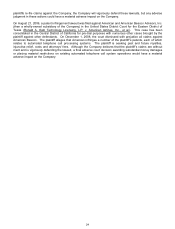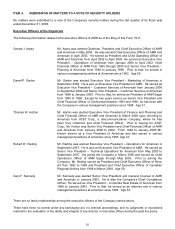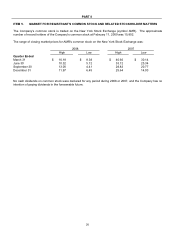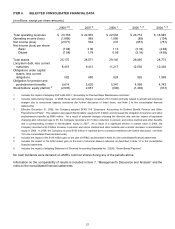American Airlines 2008 Annual Report Download - page 20
Download and view the complete annual report
Please find page 20 of the 2008 American Airlines annual report below. You can navigate through the pages in the report by either clicking on the pages listed below, or by using the keyword search tool below to find specific information within the annual report.17
Our labor costs are higher than those of our competitors.
Wages, salaries and benefits constitute a significant percentage of our total operating expenses. In 2008, they
constituted approximately 26 percent of our total operating expenses. All of the major hub-and-spoke carriers with
whom American competes have achieved significant labor cost savings through or outside of bankruptcy
proceedings. We believe American’s labor costs are higher than those of its primary competitors, and it is unclear
how long this labor cost disadvantage may persist.
We could be adversely affected if we are unable to have satisfactory relations with any unionized or other
employee work group.
Our operations could be adversely affected if we fail to have satisfactory relations with any labor union
representing our employees. In addition, any significant dispute we have with, or any disruption by, an employee
work group could adversely impact us. Moreover, one of the fundamental tenets of our strategic Turnaround Plan
is increased union and employee involvement in our operations. To the extent that we are unable to have
satisfactory relations with any unionized or other employee work group, our ability to execute our strategic plans
could be adversely affected.
American is currently in mediated negotiations with each of its three major unions regarding amendments to their
respective labor agreements. American Eagle is also in mediated negotiations with the TWU. The negotiations
process in the airline industry typically is slow and sometimes contentious. The union that represents American’s
pilots has recently filed a number of grievances, lawsuits and complaints, most of which American believes are
part of a corporate campaign related to the union’s labor agreement negotiations with American. While American
is vigorously defending these claims, unfavorable outcomes of one or more of them could require American to
incur additional costs, change the way it conducts some parts of its business, or otherwise adversely affect us.
Our insurance costs have increased substantially and further increases in insurance costs or reductions
in coverage could have an adverse impact on us.
We carry insurance for public liability, passenger liability, property damage and all-risk coverage for damage to our
aircraft. As a result of the Terrorist Attacks, aviation insurers significantly reduced the amount of insurance
coverage available to commercial air carriers for liability to persons other than employees or passengers for claims
resulting from acts of terrorism, war or similar events (war-risk coverage). At the same time, these insurers
significantly increased the premiums for aviation insurance in general.
The U.S. government has agreed to provide commercial war-risk insurance for U.S. based airlines through
March 31, 2009, covering losses to employees, passengers, third parties and aircraft. Beyond that date, the
Secretary of Transportation has the authority to provide commercial war-risk insurance until May 31, 2009. If the
U.S. government does not extend the policy beyond March 31, 2009 (or beyond May 31, 2009 if the Secretary has
exercised the authority to extend coverage to that date), or if the U.S. government at any time thereafter ceases to
provide such insurance, or reduces the coverage provided by such insurance, we will attempt to purchase similar
coverage with narrower scope from commercial insurers at an additional cost. To the extent this coverage is not
available at commercially reasonable rates, we would be adversely affected.
While the price of commercial insurance had declined since the period immediately after the Terrorist Attacks, in
the event commercial insurance carriers further reduce the amount of insurance coverage available to us, or
significantly increase its cost, we would be adversely affected.
We may be unable to retain key management personnel.
Since the Terrorist Attacks, a number of our key management employees have elected to retire early or leave for
more financially favorable opportunities at other companies, both within and outside of the airline industry. There
can be no assurance that we will be able to retain our key management employees. Any inability to retain our key
management employees, or attract and retain additional qualified management employees, could have a negative
impact on us.


